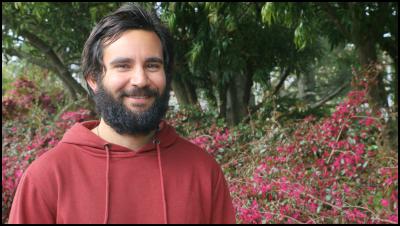Researching the honey buzz
8 September, 2016
Researching the honey buzz

A University of Waikato Master of Science student is researching how to improve the quality of nectar in Mānuka plants, to produce better honey.
Stevie Noe is in the data-collecting phase of his thesis. He spends most days in a greenhouse, collecting and analysing nectar from Mānuka plants.
“Right now I’m measuring how much nectar is produced in the flowers and how that quality changes based on different growing conditions such as temperature, humidity and light,” says Stevie.
Stevie tests the quality of the nectar based on how much dihydroxyacetone (DHA) is present. DHA converts to methylglyoxal (MGO) which is the key ingredient that gives Mānuka honey its reputed health properties. The more DHA there is in the nectar, the more MGO there’ll be in the honey.
After completing a Bachelor of Science, Stevie decided to do his masters on this topic because the Mānuka honey industry is booming.
“Honey is a big deal at the moment. The industry is trying to grow as there’s more demand than there is supply, and the government is backing this growth,” he says.
Stevie recently won the University of Waikato’s Masters Three Minute Thesis (3MT) competition. He was the top presenter out of 10 students who had to summarise their research in just three minutes.
“The competition was a good experience and winning meant I got a $1000 research grant to help fund my studies, which is a big help.”
That’s not the only support Stevie’s received. He’s managed to fund his masters degree with two University of Waikato postgraduate scholarships and Pre-Seed Accelerator Funding (PSAF) from the Ministry of Science and Innovation.
Stevie’s in the final six months of a two-year academic journey. He hopes his research findings will help Mānuka honey producers in New Zealand and around the world.
“Hopefully by the end of it I’ll be able to tell growers how best to test their Mānuka plants to get top results out of their honey,” he says.
If you’re interested in turning your ideas into world-changing research, find out more about postgraduate study at the University of Waikato. Applications are now open for 2017.
ENDS


 Commerce Commission: Systemic Breaches Of Consumer Law Lead To $1.5million Fine For Kiwibank
Commerce Commission: Systemic Breaches Of Consumer Law Lead To $1.5million Fine For Kiwibank SolarZero: SolarZero Limited (in Liquidation) - Important Business Update
SolarZero: SolarZero Limited (in Liquidation) - Important Business Update Science Media Centre: Cyclone Gabrielle's Impacts On NZ's Ecosystems - Expert Reaction
Science Media Centre: Cyclone Gabrielle's Impacts On NZ's Ecosystems - Expert Reaction RNZ: Parts Of Power System Could Be Out For 36 Hours In Event Of Extreme Solar Storm
RNZ: Parts Of Power System Could Be Out For 36 Hours In Event Of Extreme Solar Storm NZAS: New Zealand Association Of Scientists Awards Celebrate The Achievements Of Scientists And Our Science System
NZAS: New Zealand Association Of Scientists Awards Celebrate The Achievements Of Scientists And Our Science System Stats NZ: Retail Spending Flat In The September 2024 Quarter
Stats NZ: Retail Spending Flat In The September 2024 Quarter



